How the cruise industry secretly backed ‘dark money’ mailers about defunding Key West police
As Key West prepared to vote on three referendums that would drastically limit the number of cruise ships allowed to dock at the city’s port — and potentially set a precedent that could do nationwide damage to one of the country’s biggest tourism industries — cruise companies knew they had to do something to sway the public into voting no.
But the companies, pollsters had told them, were not popular in the tropical resort city, and the limits were expected to pass. Any “no” campaign had to seem as if it was coming from locals, such as the bar, restaurant and shop owners who were building a campaign against the ballot measures.
And so in the months before the election an innocuously named nonprofit called Protect our Jobs, Inc., began deluging Key West mailboxes with ominous and misleading mailers. The mailers claimed that voting in favor of the referendums would cripple Key West’s economy, forcing drastic cuts to public services and safety.
“There’s a sound downstairs, will anyone respond to the call?” said one mailer that featured a photo of a scared, wide-eyed woman in her bed.
The nonprofit, registered to lobbyists at a powerful Tallahassee lobbying firm, wouldn’t say who was funding a campaign that linked “defunding the police” — the contentious slogan born out of the summer’s racial justice protests — to referendums about cruising.
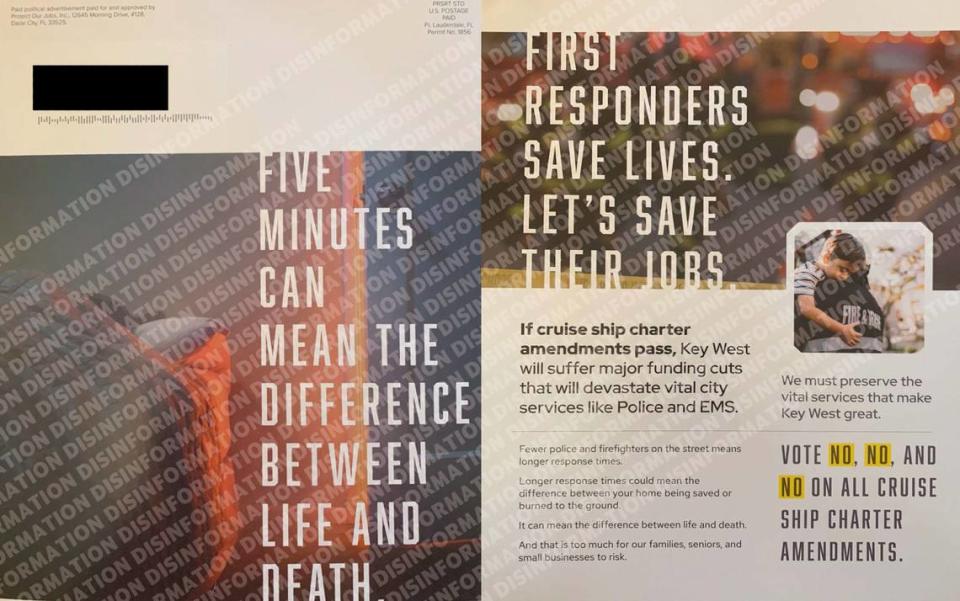
But the mailers left a trail of financial bread crumbs in tax filings, campaign finance records and corporate paperwork reviewed by the Miami Herald. They show that the cruise industry, which at least publicly stayed out of the campaign, secretly used a “dark money” scheme to funnel funds to the nonprofit responsible for the mailers.
The scheme, while legal, reveals how powerful business interests can seek to manipulate the public during political campaigns while keeping their hands clean. It effectively hid from voters the identity of those paying for the disinformation campaign, which failed at the polls when the referendums passed by wide margins.
“It’s moving money around simply for the sake of obscuring the identity of the source of the money,” said Frances Hill, a campaign-finance expert and professor at the University of Miami Law School who reviewed the Herald’s findings. “This is really pretty standard, which is not to say it’s right. When you look at this, you say: Why not sign your name to it? Why not stand up and say what you believe and have an honest dialogue?”
Here’s how it worked:
In early 2020, a Virginia-based political organization called Community Leadership PAC received a $100,000 donation from Cape Liberty Transfers, a Delaware company that shares an address with the PortMiami headquarters of cruise company Royal Caribbean Group, federal tax filings show. It also received $100,000 from an Alaska hotel chain owned by cruise company Carnival Corporation in January, as well as $2,000 from the lobbying firm Alcalde & Fay Ltd, the longtime lobbying firm of Cruise Lines International Association (CLIA), an industry trade group. In previous years, Community Leadership PAC received large donations from other major cruise companies.
In a series of three contributions in June, August and September, Community Leadership PAC turned around and donated a total of $236,000 to a Florida political committee called Florida Cruise PC, which also received $20,000 directly from cruise company MSC Cruises in January. Florida Cruise PC then donated $175,000 in two transactions on Aug. 27 and Sept. 3 to Protect our Jobs, Inc, the nonprofit that sent out the mailers.
Employees of Alcalde & Fay, CLIA’s federal lobbying firm, are listed on the paperwork for both Community Leadership PAC and Florida Cruise PC.
The Royal Caribbean Group, MSC Cruises and Carnival Corp. donations happened before the campaign to get the cruise ship referendums on the November ballot began in Key West in May. It’s possible Protect Our Jobs, Inc., received money from other sources too, but as a nonprofit it doesn’t have to disclose its donors, adding another layer of secrecy.
In response to the Herald’s findings, CLIA spokesperson Bari Golin-Blaugrund said in an email, “CLIA has no connection to the funding or management of Florida Cruise PC or the Community Leadership PAC.”
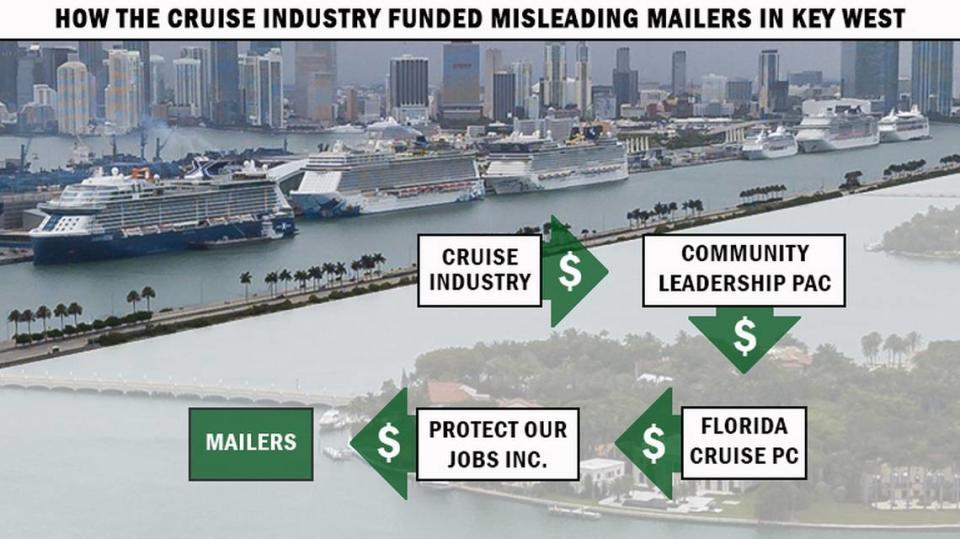
Carnival Corporation spokesperson Roger Frizzell said in an email, “Our contribution to Community Leadership was made in January 2020 before the referendum effort in Key West ever began. In addition, that contribution is publicly reported.”
MSC Cruises spokesperson Luca Biondolillo declined to comment. Royal Caribbean Group spokesperson Jonathon Fishman declined to comment and referred questions to CLIA.
Lobbying firm Alcalde & Fay did not respond to requests for comment. Neither did Rubin & Turnbull, the Tallahassee lobbying firm that ran Protect Our Jobs, Inc.
The claims in the mailers about cuts to the city budget were exaggerated, according to city officials, economic impact studies and the Herald’s reporting.
Failure of falsehood
The secretly funded disinformation campaign failed on Election Day.
Key West voters approved all three referendums to reduce cruise ship traffic to the island: 63% voted to limit the number of daily cruise ship visitors to 1,500; 61% voted to prohibit cruise ships with a capacity of more than 1,300 people from docking; and 81% voted to give docking priority to cruise ships that have the best health and environmental records.
Opponents of the referendums, and even one veteran political consultant working with local business owners to defeat the ballot items, said they knew the mailers would backfire when they started appearing in September.
“We recognized right away when those things came out that that is not the way to do business in Key West,” said Scott Atwell, CEO of the Key West Chamber of Commerce, which spoke out against the referendums that limit cruise tourism but supported the third to prioritize the ships with the best records. “We weren’t in favor of the scare tactics.”
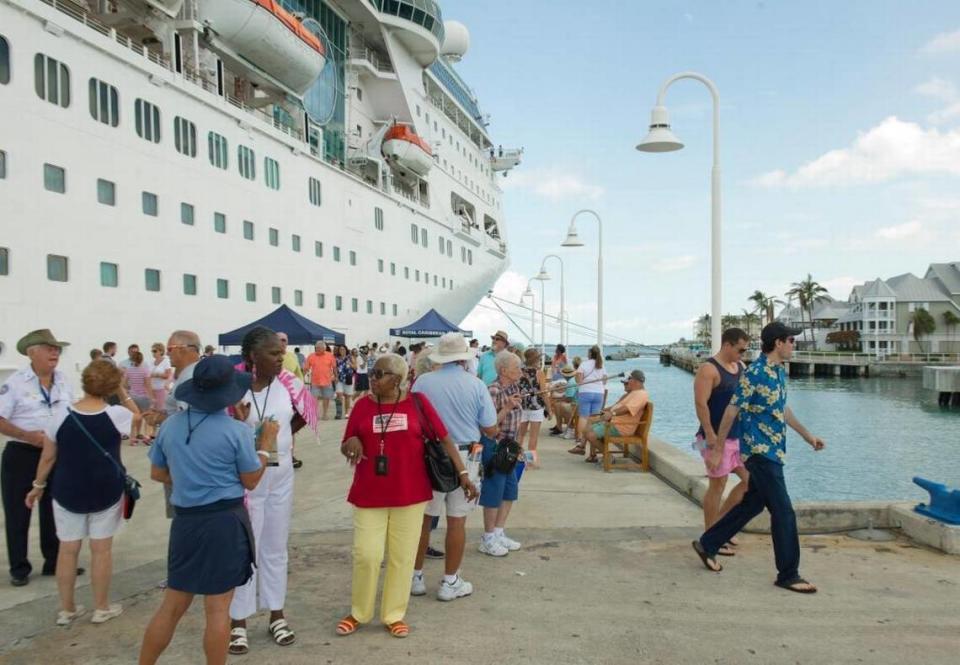
Mark Goodrich, a South Florida political consultant involved in the “no” campaign, said he quit Protect Our Jobs, Inc., after the mailers began going out. He said Rubin & Turnbull lobbyists Matthew Sacco and Erica Chanti, listed on the nonprofit’s filings as directors, pushed for the mailer campaign, despite his warnings.
“Not only did the locals not like it, but it was silly. The people who read it thought it was silly. They thought it was ridiculous,” Goodrich said. “I told them they were screwing up the campaign…[But] they were convinced that that was the right path forward. If the two lobbyists know more than the guy who did campaigns his whole life, good for you.”
In one particularly egregious example, Goodrich said, Protect Our Jobs took out a spread in a local newspaper, the Key West Weekly, that featured a heat map showing the location of the homes of people who had signed a petition in favor of the referendums. The ad was meant to show the referendums’ backers were wealthy and white.
The lobbyists, Goodrich said, should “have just kept it to the truth.”
“The lobbyists are clowns,” he added. “They’re the gang that can’t shoot straight.”
Sacco and Chanti did not respond to questions.
‘A message carried by the locals’
Key West resident Arlo Haskell led the campaign in favor of the referendums.
Citing studies showing cruise ships can degrade fragile marine environments and cruise ship passengers spend less in Key West than land-based tourists, Haskell’s group capitalized on cruise companies’ struggles to contain COVID-19 outbreaks on their ships to argue that the economic impact of the industry was not worth the environmental and quality-of-life issues it brings. Of the 50 ships that came to Key West in fiscal year 2019, only 10 would have met the new size criteria.
Haskell said he spent the early voting period trying to combat the disinformation on the mailers.
“I think our margin would have been larger if those mailers hadn’t been involved,” he said. “My gut is that we lost some votes.”
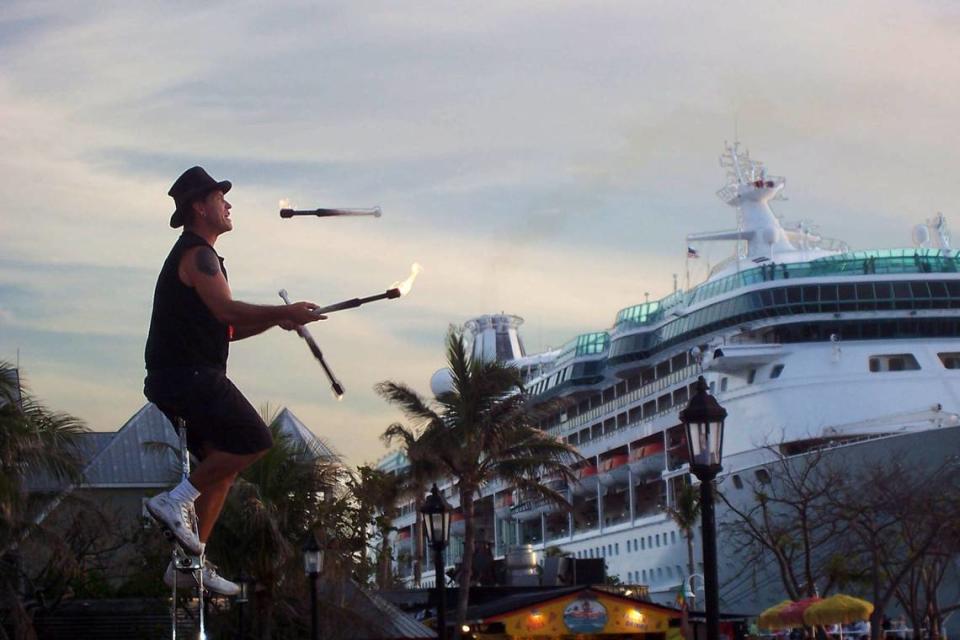
Labeled in the Herald’s Election Ad Decoder as disinformation, the mailers and similar newspaper advertisements and text messages aimed to mislead voters to believe that if the cruise referendums passed, 911 response times would lag, the police department would be “defunded,” and a “30% cut in tax revenue to the city” would cause a “massive tax increase.”
The drop in passenger disembarking fees and land-based sales tax charges will mean less revenue for the city, but there is no reason to believe the shortfall will be as drastic as the mailers claim or require cuts to emergency services, city officials say.
In the lead-up to the election, CLIA did not respond to requests for comment on the campaign, and after the election, a spokesperson referred reporters to local business owners who opposed the referendums.
The one-step-removed strategy may have to do with an internal poll obtained by the Herald that CLIA commissioned in August from Arlington, Virginia-based Frederick Polls. The poll found that the industry was unpopular among likely Key West voters. Of 419 likely voters interviewed, 48% of respondents reported a negative rating for the industry, while 35% reported a positive rating.
“A message carried by the locals damaged by these ballot issues would work better than one promoted by the Cruise industry,” the pollster recommended.
Another insight from the polling: 55% of likely voters interviewed labeled a claim that the revenue shortfall would cause “significant cuts to police officers and fire protection services” as persuasive.
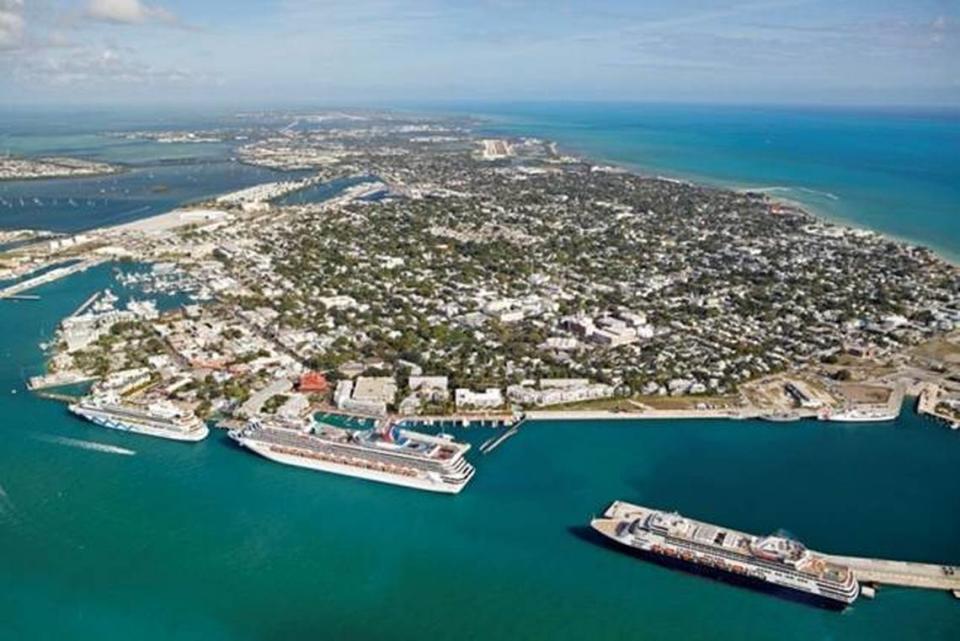
Locals were not surprised to learn that the industry was behind the mailers.
Mark Rossi, a former city commissioner who owns a cluster of bars on Duval Street and opposed the referendums, wasn’t disturbed over the mailers’ origins.
“It doesn’t bother me at all,” said Rossi. “I think it’s a good thing.”
Rossi said the new limits on cruise ship passengers and the ban on large ships will hurt Key West in more ways than one, including advertising for the island that he said cruises provide.
“It’ll devastate Key West,” Rossi said. “This has far-reaching effects.”
Referendum supporter Dakin Weekley, 41, who helps run his family’s grocery stores, said it made sense that the industry was involved.
In October, Weekley posted two of the mailers on Facebook, adding “Today in, ‘Oh you voted to regulate cruise ships? Now you’re murdered!’”
“I thought the people trying to stop the referenda were extremely desperate,” Weekley said.
Despite the election, the fight isn’t over.
The Walsh family of Delray Beach, which owns one of Key West’s three cruise piers, sued the city over the cruise referendums in the summer. A judge will evaluate the claims now that the laws have been changed.
Cruise companies are still working to meet health and safety protocols required by the U.S. Centers for Disease Control and Prevention in order to welcome passengers again.
Passenger cruises have been canceled since mid-March after COVID-19 outbreaks on multiple ships. Companies have canceled cruises in the U.S. until at least March 2021 as the COVID-19 pandemic causes record hospitalizations across the country.
A group of port community activists from around the world dubbed the Global Cruise Activist Network have banded together during the pandemic to pressure companies to change their health, safety, environmental and labor operations before they begin passenger cruises again.
On a recent press call, an activist in Alaska said she hoped the Key West election results could be replicated in other cities.
Community Leadership PAC, the Virginia-based political organization tied to the cruise industry, has also donated to a campaign in Alaska and received money from the Alaska hotel chain owned by Carnival.
And the cruise issue is likely to come up on the ballot again in Key West, said Goodrich, the political consultant, although he expects the “no” campaign to use more effective tactics next time around.
“The locals didn’t take this seriously,” he said. “They didn’t hire their own consultants, they didn’t put out their own mailers. They just put up some signs and talked to their neighbors. And they still got 40 percent.”

